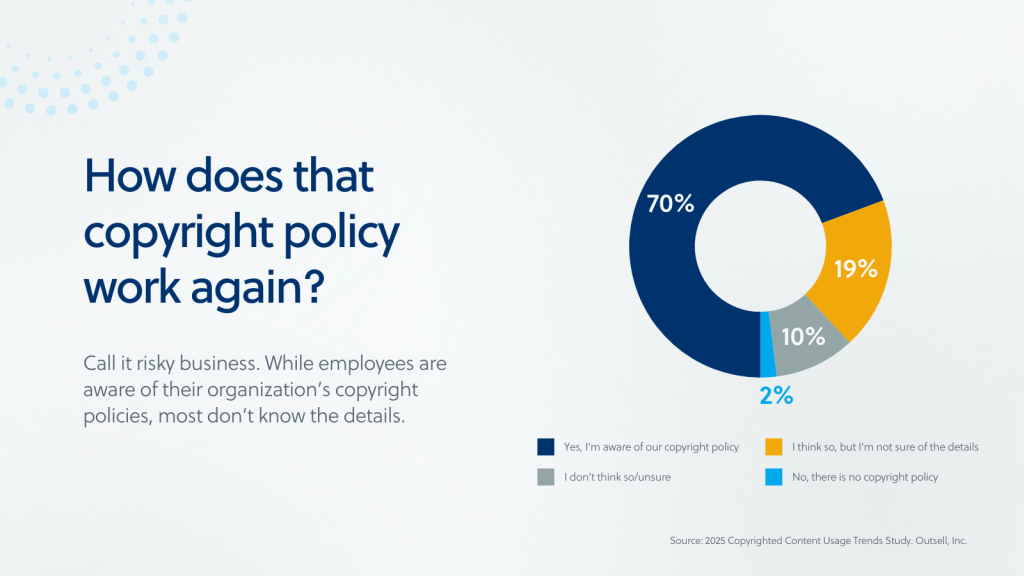The practice and business of medicine both change on a daily basis. There are always new research breakthroughs or new compliance requirements. In hospitals, everyone appreciates the urgent need to share information quickly and efficiently.
Unfortunately, fast-paced information sharing is not always consistent with federal copyright laws. Compliance is not as simple as writing a policy or reaching an agreement with a single publisher. Carefully drafted corporate agreements may still fall short of covering the vast stores of copyrighted material that populate the information workplace.
Even the most routine content exchanges may place your organization at risk of copyright infringement. And such infringement can be extremely costly. In the U.S., if the copyright holder registered the work with the U.S. Copyright Office prior to the infringement, the copyright holder may sue for compensation (and an injunction). The copyright holder may be entitled to recover damages based on its lost profits; if those are hard to prove, the copyright holder can ask the court to award statutory damages which, depending on the user’s willfulness, can range from $200 to $150,000 for each act of infringement. In some cases, it is even possible for there to be criminal liability.
In recent years, copyright infringement has become costly and hard to hide, especially considering the recent impact of AI.
Hospitals Are Responsible for Compliance
In a few clicks, information can be forwarded across the organization. Although third-party content such as articles, newsletters, research papers, graphics, videos, and images are now so easy to share, most are subject to copyright protection.
“The big misperception by corporate counsel and executives is that employee infringement is an employee issue rather than a corporate one,” says Washington DC intellectual property attorney Thomas Kirby. But the legal doctrine respondeat superior imputes liability to the corporate employer. “Corporate executives’ lawyers don’t appreciate that,” Kirby says, “and they think there has to be a special showing before the employer is liable, but it just isn’t so.”
A Solution That Supports Compliance Policies
Hospital attorneys and compliance officers understand the need to educate staff and to put policies in place. “But you also have to be careful with policies,” Chicago intellectual property attorney Kevin Tottis cautions. Impractical copyright policies that are certain to be violated are no help against infringement claims.
An extensive report published in 2025 by research firm Outsell Inc. revealed that although most employees know their organizations have copyright policies, they don’t know how they work. Of those employees surveyed, 29% are either unaware of their healthcare organization’s copyright policy or unsure of its details.

How can an organization facilitate compliance? Subscriptions and publishing agreements provide only limited help. Even though some publishers sell licenses that permit varying degrees of secondary use within an organization, it is time consuming and inefficient to ensure each subscription provides the needed coverage.
The Annual Copyright License from CCC (Copyright Clearance Center) makes it easy for affiliated employees, students, faculty, and staff to collaborate using text-based content from the industry’s most sought-after print and electronic journals and books.
CCC provides a trusted licensing solution that complements an organization’s publisher agreements and subscriptions by providing a consistent set of reuse rights across a broad repertory of titles. The Annual Copyright License enables teams to more easily collaborate using content from a wide range of sources, simplifying copyright compliance, driving innovation, and providing resources that educate employees about the importance of copyright.
Finding “Peace of Mind” with the Annual Copyright License
The Carle Foundation Hospital in Urbana, Illinois is proud of its staff’s commitment to medical research and education. Their goal is to translate laboratory research into breakthroughs in patient care. In the past when a staff member wanted to reuse a copyrighted article, librarian Jerry DeWitt had to contact the copyright holder to ask permission. This took a lot of time. And often, the permission came too late to be helpful in this fast-paced environment.
DeWitt recommended the purchase of an Annual Copyright License from CCC. “My job is to protect my organization,” explains DeWitt. “I saw potential risk in the area of copyright infringement. If I didn’t push for the Annual Copyright License, I wouldn’t be doing my job properly.”
Blue Cross Blue Shield of Vermont places a high premium on integrity and, while it may be relatively small compared to other health care insurance carriers, they have the same information needs. “There’s value to being able to copy articles and distribute them to your peers, but you need to do it in a way that is legally permissible,” says Chris Gannon, Vice President and General Counsel. “With the license from CCC, I know that this is something we can do.”
Signing the license with CCC has provided a number of tangible, as well as intangible, benefits to Blue Cross and Blue Shield of Vermont and it’s made a statement about the company and its principles. “The top benefit is the peace of mind that we’re in compliance with copyright laws,” says Gannon, “Having the CCC Annual License also gets back to integrity truly being a core value of our company.”
Keep Exploring
- Do Hospitals Need a New Approach for Accessing Scientific Literature?
- A Shift in the Velocity of Content and the Impact of AI Tools and Collaboration Platforms
- Infographic: 2025 Outsell Copyrighted Content Usage Trends – Hospitals & Healthcare Providers
- 5 Tips Every New Information Professional Should Know

